Download the case study - Human Synergistics
Download the case study - Human Synergistics
Download the case study - Human Synergistics
Create successful ePaper yourself
Turn your PDF publications into a flip-book with our unique Google optimized e-Paper software.
C A S E S T U DY I N F O R M AT I O N S H E E T N O. 8<br />
The relationship between management<br />
practices and employee behaviours<br />
Industry<br />
Finance<br />
Diagnostic tool<br />
LSI<br />
Introduction<br />
This <strong>case</strong> <strong>study</strong> emerges from a project involving <strong>the</strong> post acquisition<br />
merger/integration of customer service and sales operations in a large ‘retail’<br />
type business.<br />
Management Practices<br />
The management practices within each<br />
business group were quite different. These are<br />
listed over <strong>the</strong> page.<br />
In essence, where one had concentrated<br />
on developing a constructive culture of<br />
personal responsibility, reinforcing <strong>the</strong><br />
behaviours of Achievement, Self-Actualising,<br />
<strong>Human</strong>istic-Encouraging and Affiliative,<br />
<strong>the</strong> o<strong>the</strong>r organisation had focused on a<br />
more ‘control’ paradigm of management.<br />
Organisation A<br />
Organisation B<br />
Organisation A took over Organisation B<br />
C a s e S t u d y I n f o r m a t i o n S h e e t<br />
w w w. h s n z . c o . n z | w w w. h u m a n - s y n e r g i s t i c s . c o m . a u
C A S E S T U DY I N F O R M AT I O N S H E E T<br />
w w w. h s n z . c o . n z | w w w. h u m a n - s y n e r g i s t i c s . c o m . a u<br />
The relationship between management practices and employee behaviours<br />
Key differences in managerial practices<br />
between <strong>the</strong>se two organisations were:<br />
Acquiring Organisation<br />
• A management style that promoted<br />
individual responsibility<br />
• Focus on developing <strong>the</strong> ‘whole person’<br />
• Team goals and targets<br />
• Flat management structure<br />
• Performance focused at <strong>the</strong> team level,<br />
with Team Leaders being <strong>the</strong> key level of<br />
management<br />
• Emphasis on culture - in particular, one<br />
that reinforces constructive behaviours<br />
• Encourages self-set goals<br />
• Rewards outputs (sales etc)<br />
• Celebrates success<br />
As a result, <strong>the</strong> profiles (see page 1) show<br />
that staff behave in <strong>the</strong> following ways:<br />
Acquiring Organisation<br />
• Goal oriented<br />
• Analytical - examining options before acting<br />
• Prepared to learn<br />
• Supportive of each o<strong>the</strong>r<br />
• Prepared to take responsibility<br />
• Striving for standards of ‘excellence’<br />
• Creative<br />
• Friendly<br />
• Encourage each o<strong>the</strong>r<br />
• Use own initiative<br />
• Be fairly critical<br />
• See that your own personal effort makes<br />
a difference<br />
Acquired Organisation<br />
• A management style that emphasised<br />
control and procedure<br />
• Focus on developing job skills<br />
• Individual goals and targets<br />
• Hierarchical management structure<br />
• Performance focused at <strong>the</strong> total business<br />
unit level, with all power invested in<br />
managers<br />
• Emphasis on tasks, with managers<br />
responsible for control and workers<br />
responsible for outputs<br />
• Managers set goals for individuals<br />
• Rewards inputs (time etc)<br />
• Stoical about success<br />
Acquired Organisation<br />
• Low goal orientation<br />
• Follow procedures only<br />
• Avoid unfamiliar circumstances<br />
• Supportive of each o<strong>the</strong>r<br />
• Avoid responsibility<br />
• Do what is expected<br />
• Non creative<br />
• Superficial relationships<br />
• Focus on individual effort<br />
• Seek decisions from superiors<br />
• Be fairly critical<br />
• Personal effort does not make<br />
much difference<br />
Auckland<br />
10 York Street<br />
PO Box 37-483<br />
Telephone 09 309 9010<br />
Facsimile 09 379 2263<br />
Wellington<br />
1 Willeston Street<br />
PO Box 27-327<br />
Telephone 04 470 7700<br />
Facsimile 04 470 7711<br />
Sydney<br />
8 Windmill Street<br />
Millers Point NSW 2000<br />
Telephone 02 9271 5900<br />
Facsimile 02 9247 6310<br />
Melbourne<br />
470 Collins Street<br />
Melbourne, VIC 3000<br />
Telephone 03 9675 0100<br />
Facsimile 03 9629 3095<br />
Copyright Policy All publications of <strong>Human</strong> <strong>Synergistics</strong> International and <strong>Human</strong> <strong>Synergistics</strong> NZ Ltd, and its associated authors are copyrighted. Their reproduction, in<br />
whole or in part, by any process, is a violation of copyright law. This policy applies, but is not limited to, any learning instrument or section <strong>the</strong>reof, as well as answer sheets, scoring<br />
devices, profiles, report forms, tables, charts, norms or o<strong>the</strong>r quoted material found in instruments.


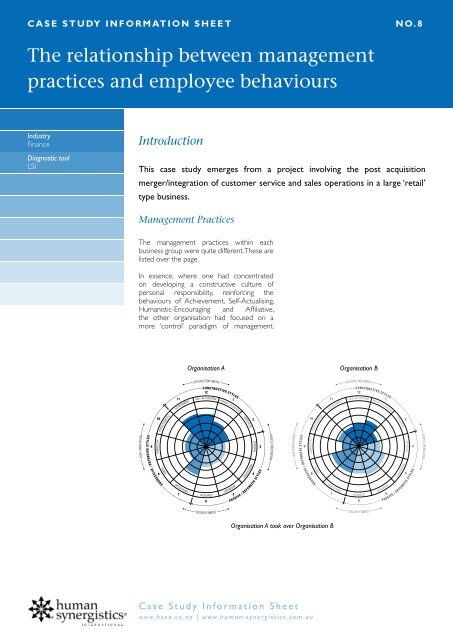
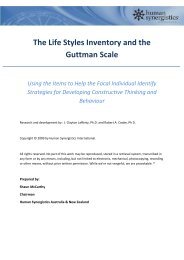
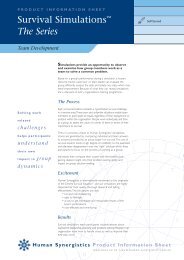
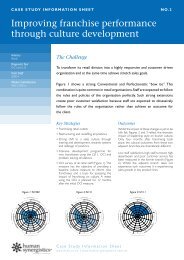
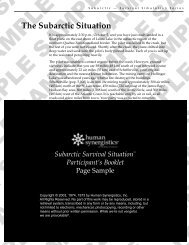
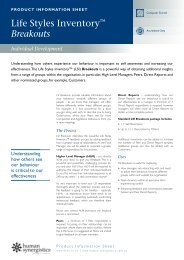
![Life Styles Inventory 2⢠[LSI 2] - Human Synergistics](https://img.yumpu.com/38476838/1/184x260/life-styles-inventory-2a-lsi-2-human-synergistics.jpg?quality=85)
![Group Styles Inventory⢠[GSI] - Human Synergistics](https://img.yumpu.com/38476833/1/184x260/group-styles-inventorya-gsi-human-synergistics.jpg?quality=85)